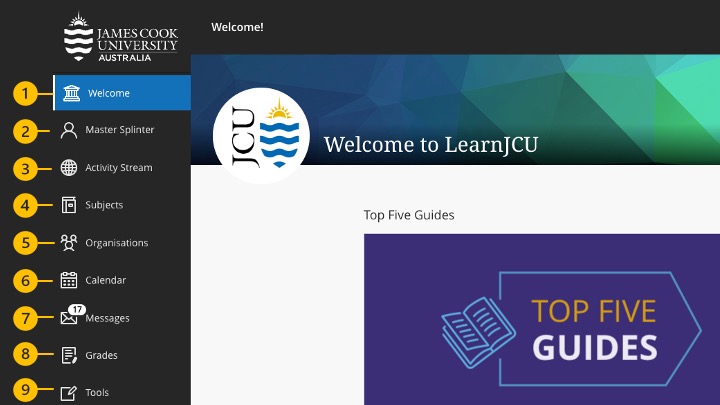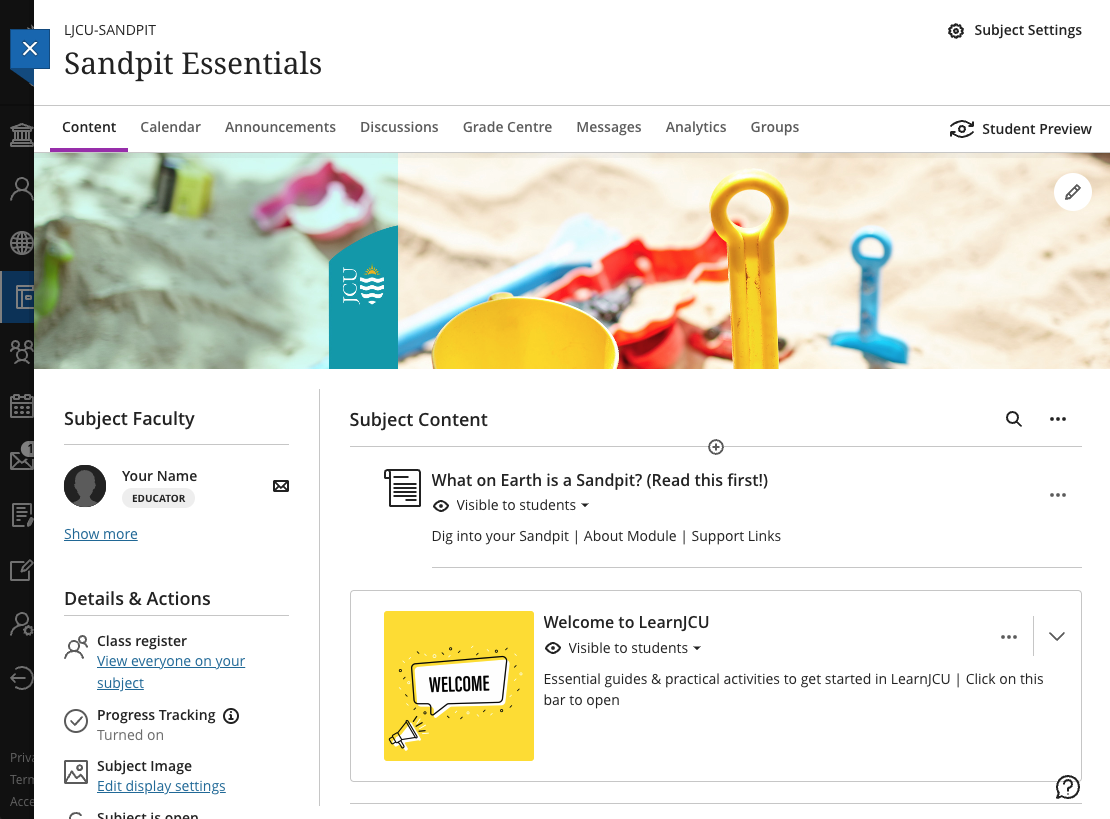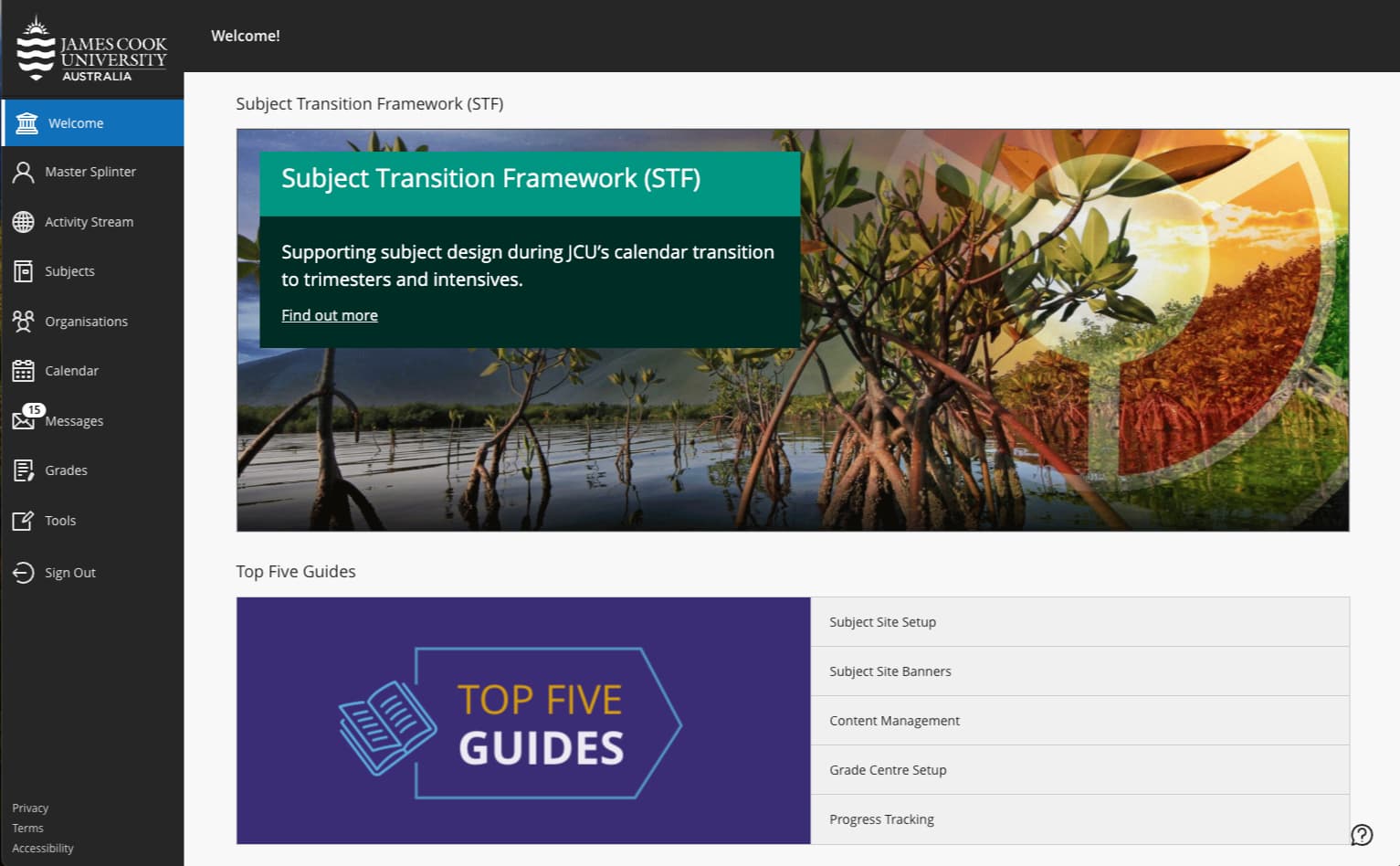CEE TEL Design About LearnJCU
LearnJCU
- Future Students
- JCU Global Experience
- International Students
- Open Day
- How to apply
- Pathways to university
- Virtual Open Day
- Living on Campus
- Courses
- Publications
- Scholarships
- Parents and Partners
- JCU Heroes Programs
- Aboriginal and Torres Strait Islander in Marine Science
- Elite Athletes
- Defence
- Current Students
- New students
- JCU Orientation
- LearnJCU
- Placements
-
CEE
- Search
- About CEE
- Education Strategy
- Teaching@JCU Support
- Assessment@JCU
-
TEL Design
- About LearnJCU
-
Assessment & Feedback
- Artificial Intelligence
- Assessment Tools
- Assessing Group Work
- Assessment Case Studies
- Assessment Methods
- Enable or Disable Submission View
- Inline Marking
- Grade Centre Setup
- Group Assessment Tools
- Marking and Feedback
- Multiple Choice Questions
- One Question at a Time
- Peer Review
- Release Conditions
- Respondus Secure Online Exams
- Respondus FAQs
- Safe Assign
- Save Grade Centre Filtering
- Submission Receipts
- Test Response Download
- Test Settings
- Timezones
- Video Assessment
- Collaboration
- Communication
-
Content & Learning Resources
- Accessibility in LearnJCU
- Banners for Subjects
- Computations
- Content Management
- Create Studio
- DIY Engaging Videos
- Emojis in Ultra Docs
- Exemplars in LearnJCU
- H5P in LearnJCU
- Hypothesis
- Intro Videos
- Learning Sequence (PDF)
- LearnJCU Layouts (PDF)
- Digital Media Support
- LinkedIn Learning
- Mayer's 12 Principles of Multimedia (PDF)
- Media Resources
- Open and Licensed Resources
- Padlet in LearnJCU
- Panopto Video Capture
- PebblePad ePortfolios
- Progress Tracking
- Release Conditions
- Subject Site Setup
- Organisation & Structure
- Participation & Engagement
- The Learn Lowdown
- Teach with Tech Ebook
- Data & Evaluation
- Student Success
-
Development & Recognition
- Professional Development
- PD Webinar Recordings
-
Grants & Awards
- JCU Learning & Teaching Innovation Grants
- JCU Sessional Teaching Awards
- JCU Inclusive Practice Awards
- JCU Inclusive and Accessible LearnJCU Site Awards
- JCU Citations for Sustained Commitment to Enhancing Diversity, Equity and Inclusion
- JCU Citations for Outstanding Contributions to Student Learning
- National Citations for Outstanding Contributions to Student Learning
- JCU DVC Education's Student Experience Award
- Showcasing Excellence
- Communities of Practice
- SoLT @JCU
- Unicare Centre and Unicampus Kids
- Graduation
- Off-Campus Students
- JCU Job Ready
- Safety and Wellbeing
- JCU Prizes
- Professional Experience Placement
- Employability Edge
- Art of Academic Writing
- Art of Academic Editing
- Careers and Employability
- Student Equity and Wellbeing
- Career Ready Plan
- Careers at JCU
- Partners and Community
- JCU-CSIRO Partnership
- Alumni
- About JCU
- Reputation and Experience
- Chancellery
- Governance
- Celebrating 50 Years
- Academy
- Indigenous Engagement
- Education Division
- Graduate Research School
- Research and Teaching
- Research Division
- Research and Innovation Services
- CASE
- College of Business, Law and Governance
- College of Healthcare Sciences
- College of Medicine and Dentistry
- College of Science and Engineering
- CPHMVS
- Anthropological Laboratory for Tropical Audiovisual Research (ALTAR)
- Anton Breinl Research Centre
- Agriculture Technology and Adoption Centre (AgTAC)
- Advanced Analytical Centre
- AMHHEC
- Aquaculture Solutions
- AusAsian Mental Health Research Group
- ARCSTA
- Area 61
- Lions Marine Research Trust
- Australian Tropical Herbarium
- Australian Quantum & Classical Transport Physics Group
- Boating and Diving
- Clinical Psychedelic Research Lab
- Centre for Tropical Biosecurity
- Centre for Tropical Bioinformatics and Molecular Biology
- CITBA
- CMT
- Centre for Disaster Solutions
- CSTFA
- Cyclone Testing Station
- The Centre for Disaster Studies
- Daintree Rainforest Observatory
- Fletcherview
- JCU Eduquarium
- JCU Turtle Health Research
- Language and Culture Research Centre
- MARF
- Orpheus
- TESS
- JCU Ideas Lab
- TARL
- eResearch
- Indigenous Education and Research Centre
- Estate
- Work Health and Safety
- Staff
- Discover Nature at JCU
- Cyber Security Hub
- Association of Australian University Secretaries
- Services and Resources Division
- Environmental Research Complex [ERC]
- Foundation for Australian Literary Studies
- Gender Equity Action and Research
- Give to JCU
- Indigenous Legal Needs Project
- Inherent Requirements
- IsoTropics Geochemistry Lab
- IT Services
- JCU Webinars
- JCU Events
- JCU Motorsports
- JCU Sport
- Library
- Mabo Decision: 30 years on
- Marine Geophysics Laboratory
- Office of the Vice Chancellor and President
- Outstanding Alumni
- Pharmacy Full Scope
- Planning for your future
- Policy
- PAHL
- Queensland Research Centre for Peripheral Vascular Disease
- Rapid Assessment Unit
- RDIM
- Researcher Development Portal
- Roderick Centre for Australian Literature and Creative Writing
- Contextual Science for Tropical Coastal Ecosystems
- State of the Tropics
- Strategic Procurement
- Student profiles
- SWIRLnet
- TREAD
- TropEco for Staff and Students
- TQ Maths Hub
- TUDLab
- VAVS Home
- WHOCC for Vector-borne & NTDs
- Media
- Copyright and Terms of Use
- Australian Institute of Tropical Health & Medicine
- Pay review
LearnJCU is JCU's digital learning environment, which comprises both the Learning Management System, Blackboard Learn Ultra, and several interoperable tools, such as Panopto, Collaborate, H5P, Padlet, PebblePad etc.

All subjects are allocated a LearnJCU subject site that academics can use to share content and communicate with students.
- An electronic copy of the subject outline
- Staff contact details
- Lecture notes and recordings
- Digital media such as screencasts and YouTube videos
- Web based resources
- Subject readings
- Assessment submission areas to facilitate electronic submissions (including an originality reporting service)
- Feedback on submitted assessment
- Communication tools and collaboration spaces
- Notifications about due dates or last-minute room changes
- Test students' understanding
- Control the release of content
- Manage and communicate student grades
- Online assessment marking and feedback
- Setup virtual collaboration spaces and discussion boards
- Track student progress and identify potentially at-risk students
Getting started with LearnJCU
To access LearnJCU, click the LearnJCU button at the top-right of the JCU website.
Access is also provided via mobile.
External access
If you have a user ID starting with 'ljcu', go to 'Non-JCU members special sign in'.
Access to LearnJCU
Check out the step-by-step procedure below to resolve your access problems
Access to subject sites
LearnJCU consists of self-contained sites. There are also features that let you work across sites. To access any LearnJCU site you need to be enrolled. LearnJCU has two main types of sites.
Subjects
Academic subject sites are the formal sites associated with each JCU subject offering and student enrolment. Staff enrolment is managed by College Academic Services. They are released by Learning Environments in late September in preparation for the following year and are pre-populated with the JCU LearnJCU Subject Template.
Organisations
Organisations give you a space to work with students and other staff outside subjects. Organisations can be associated with subjects, courses, or activities (e.g. placement and student exchange programs). They can also be staff-only sites for training and programs. Learning Environments create Organisations on request.
Other
Sandpit Sites: For testing and experimenting with the tools
Essentials Sites: For internal staff training modules, such as Subject Coordinator Essentials, JCU Respect, Academic Integrity etc.
Development and Master Sites: Subject-specific options for development and content management. You can enquire about these if you think they would be suitable for a project.
Basic LearnJCU structure
In the main menu, you will find:

- Welcome: Helpful links, news, and support resources (see table below).
- Profile: This will appear on the menu as your name. Add a photo, pronouns, and how to pronounce your name. Staff and students in your subjects can see this information when they see your name in LearnJCU.
- Activity Stream: A summary of activities across your subjects and organisations.
- Subjects: Access to past, present, and future subjects you’re enrolled in.
- Organisations: Access to organisations. You will only have this option if you are enrolled in an organisation.
- Calendar: View course events and assessment due dates across your subjects and organisations.
- Messages: View and send messages (similar to email) across your subjects and organisations.
- Grades: See what needs grading across all your courses.
- Tools: Access global functions that are outside of your courses such as portfolios or the Content Collection.
Site menu
When you are on a Subject Site you will see a top bar menu for assessing key site features, such as Content, Calendar, Announcements, Discussions, Grade Centre, Messages, Analytics, and Groups.

Creating content
- Creating Course material
- Creating Ultra documents
- Content editor functionality
- Creating Learning Modules
- Inserting Panopto videos
- Inserting YouTube videos
- Inserting LinkedIn Learning (Lynda.com) courses
- Using PebblePad
- Using H5P
- Building a glossary (not available in Ultra)
- View a site as a student with 'Student Preview'
- Additional information…
Managing content
- Editing and managing content
- Release Conditions (managing the release of content)
- Using the calendar
- Setting up notifications
- Using Subject Files
- Batch Edit
- Set subject availability
- Coping content from another subject
Media
Communication
- Announcements to students
- Enable Conversations on items
- Messages (one-way email) tool
- Discussion boards
- Contact information in a subject site
- Using the calendar
- Setting up notifications
Collaboration
Blackboard Collaborate (virtual rooms)
Assignments
- Creating and editing assignment submission dropboxes
- Assignment Grade Settings
- Using rubrics
- Enabling SafeAssign
- Downloading assignments in bulk
- Annotating (inline marking) assignment submissions Enabling SafeAssign
- Additional information...
Tests (Quizzes)
- Creating a test
- What question types are available in Ultra?
- Editing tests and questions
- Randomise questions and answers
- Grading tests
- Reuse questions
- Question banks
- Question pools (random question sets)
- Using Respondus Lockdown Browser
- Download the Respondus Lockdown Browser (Windows and Mac)
- Viewing Question Analysis
- Finding YourJCU subject reports from previous years
- Additional information…
Grade Centre
- Navigating the Grade Centre
- Views of Grade Centre
- Saving Grade Center filters
- IGrading Tasks
- Grading an assessment item
- Downloading the Grade Centre to work offline
- Downloading assignments in bulk
- Multiple grading schemas
- Additional information...
Marking Feedback
Subject Survey Reports
- Accessing LEVEL 1 Subject Reports (available from subject site)
- Accessing LEVEL 2 Subject Reports (if you have access)
LearnJCU Activity Data
LearnJCU Organisations (formerly known as Communities)
LearnJCU Known Issues lists any technical issues known to affect the expected function of LearnJCU and integrated systems for staff and/or students.
A description of each issue is provided along with a workaround where possible.
Preview and Learn
Dig into LearnJCU with a new Sandpit Site!
Our Sandpit Essentials, also known as practice subject sites, now feature a module to guide you through LearnJCU and its tools. The module is designed to provide hands-on experience, complete with example content, including every question type and a question bank for testing and experimentation.
While the module is designed with new users in mind, it also offers value to current users who are interested in discovering the latest features. If you already have a sandpit in place and wish to have the module added, we're more than happy to assist you with that!
Request a Sandpit (or just the Module)

All LearnJCU subject sites are pre-populated with the Institutional LearnJCU Subject Site Template.
The template includes four key folders that aim to establish consistency across the student navigation (see elements outlined in the Student Digital Experience Policy and the LearnJCU Content Management Procedure).
Read Subject Site Setup.
The 'Welcome' page in LearnJCU has helpful links and support resources that you can easily access when you need them.

Keep an eye out for upcoming workshops.